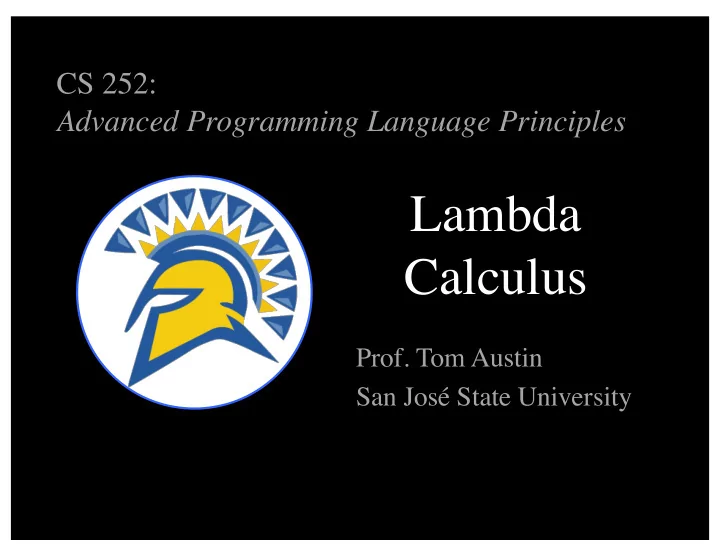

CS 252: Advanced Programming Language Principles Lambda Calculus Prof. Tom Austin San José State University
Minimum complete programming language?
WARNING: I expect you to remember every construct of this language for exams
Lambda Calculus expressions e ::= expressions: x variables | ( λ x.e) lambda abstractions | e e function application We could have just said "function", but we want to sound cool
Lambda Calculus values v ::= values: ( λ x.e) lambda abstractions When our program finishes running, it returns some complex function as its "value"
Function application Suppose we have a function: ( λ x.E) v replaces x Where E is some complex expression. wherever it How do we evaluate: occurs in E à ( λ x.E) v E[x->v]
Small step semantics for λ -calculus (in-class)
Operational Semantics [Ctxt1] e1 -> e1' e1 e2 -> e1' e2 [Ctxt2] e2 -> e2' ( λ x.e) e2 -> ( λ x.e) e2' [Call] ( λ x.e) v -> e[x->v]
Example: Identity Function ( λ x.x) ( λ a. λ b.a) à x[x->( λ a. λ b.a)] à ( λ a. λ b.a)
When should we evaluate function arguments?
Strict Evaluation Strategies Evaluate function arguments first • Call-by-value: copy of the parameter is passed • Call-by-reference: implicit reference is passed
Lazy Evaluation Strategies Substitute arguments in function body • Call-by-name: re-evaluate the argument each time • Call-by-need: memoizes parameter value after use
How powerful is this language?
The lambda-calculus is Turing complete . You can also implement the λ -calculus w/ a Turing machine In other words, the two are equal in power
Translating λ -calc to Haskell Lambda-calculus Haskell x x ( λ x.e) (\x -> e) e e e e
Extending the lambda calculus (in class)
Lab: Develop new features in the Lambda Calculus using Haskell Details on Canvas. Starter code is available on the course website.
Recommend
More recommend